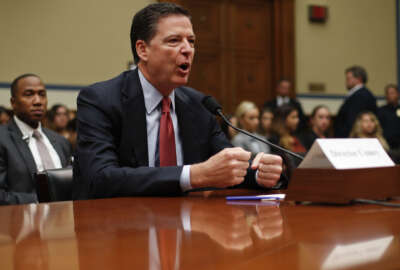

A group of senators and House members said "extensive issues with the FBI's current whistleblower program make the bureau one of the most difficult places" to...
A small group of senators and congressmen have asked the Government Accountability Office to review whistleblower protections for FBI employees, again, after hearing continued complaints about the agency’s procedures.
The group includes Senate Judiciary Committee Ranking Member Chuck Grassley (R-Iowa), as well as Gary Peters (D-Mich.) and Rob Portman (R-Ohio), the chairman and ranking member of the Senate Homeland Security and Governmental Affairs Committee.
Rep. Carolyn Maloney (D-N.Y.), the leader of the Oversight and Reform Committee, as well Rep. Jackie Speier (D-Calif.), joined their Senate colleagues in writing to Comptroller General Gene Dodaro.
“Extensive issues with the FBI’s current whistleblower program make the bureau one of the most difficult places in the federal government to report malfeasance,” House members and senators wrote in a Nov. 3 letter.
They’re asking GAO for an update to a report it completed in 2015, which found weaknesses in the statutory protections afforded to most FBI employees. FBI guidance to employees about their whistleblower rights and the bureau’s procedures was often confusing, GAO said, and the bureau often took years to close retaliation complaints.
It’s been several years since Congress revisited more comprehensive FBI whistleblower protections for the agency’s employees. Lawmakers passed the FBI Whistleblower Protection Enhancement Act (WPEA) back in 2016, which expanded the list of appropriate officials who could receive protected disclosures, to include an employee’s direct supervisor, members of Congress and the Office of Special Counsel.
Under prior law, FBI employees could only make protected disclosures to a small number of officials, a procedure that applied only to the bureau and no other federal agency.
“Despite these efforts, problems remain. DOJ still has not promulgated regulations to implement Congress’ changes,” the senators and House members wrote. “Our offices also continue to receive reports that many of the previous flaws found in the GAO report persist and that additional issues, such as retaliation against FBI employees via revocation of security clearances, are on the rise. Finally, unlike other federal employees, FBI employees still are required to make their claims internally and have no recourse to an independent appeals process.”
The senators and congressmen cited a few instances where they believed current FBI whistleblower procedures were falling short. Some FBI whistleblowers who have won their cases and have been reinstated back to their positions had their security clearances revoked upon their return, the lawmakers said.
They also pointed to the case of Darin Jones, an FBI whistleblower who made at least eight disclosures of what he believed were violations of procurement law and the Federal Acquisition Regulation (FAR) to his supervisors.
The FBI fired him in 2012. Jones appealed his termination with the Justice Department’s inspector general and tried to take his case to the Merit Systems Protection Board, which currently doesn’t have jurisdiction over most FBI whistleblower retaliation cases.
DOJ dismissed Jones’ whistleblower retaliation complaint because he took his disclosures to his supervisors, the department said at the time. It denied Jones’ case the same week Congress passed the FBI WPEA into law, which expanded the number and types of agency officials who could hear disclosures.
As Federal News Network has previously reported, numerous members of Congress have asked DOJ to review Jones’ case in light of the 2016 law, to no avail. Attorneys at the National Whistleblower Center had said Jones’ case was the “textbook example” of the need to change FBI whistleblower protection laws.
Jones and whistleblower advocates have said Congress needs to change the law to allow federal workers, FBI employees included, the right to have their cases heard in a court of appeals.
“For these whistleblowers and the vast majority of FBI employees, there is no one else they
can appeal to outside the silo of the Justice Department,” the senators and House members wrote.
The lawmakers want GAO to review how FBI whistleblower protections compare to those that other federal workers have and whether the agency’s program adequately protects employees from retaliation. They want to know how many whistleblowers at the agency have made protected disclosures since Congress passed the FBI WPEA in 2016 and how many disclosures went to direct supervisors.
Lawmakers also questioned what mechanisms the FBI and DOJ have in place to ensure those who retaliate against whistleblowers are disciplined, and they asked GAO to review existing policies on revoking security clearances.
Whistleblower advocates have said the 2016 FBI WPEA was a mere shadow of the protections they wanted to see Congress enact.
Advocates within the last year have said they see promise in the Whistleblower Protection Improvement Act, which Maloney and Rep. Nancy Mace (R-S.C.) introduced earlier this year.
The bill, which would give federal employees whistleblowers access to a jury trial under certain circumstances, cleared the oversight committee and now awaits a full vote in the House.
Copyright © 2025 Federal News Network. All rights reserved. This website is not intended for users located within the European Economic Area.
Nicole Ogrysko is a reporter for Federal News Network focusing on the federal workforce and federal pay and benefits.
Follow @nogryskoWFED



